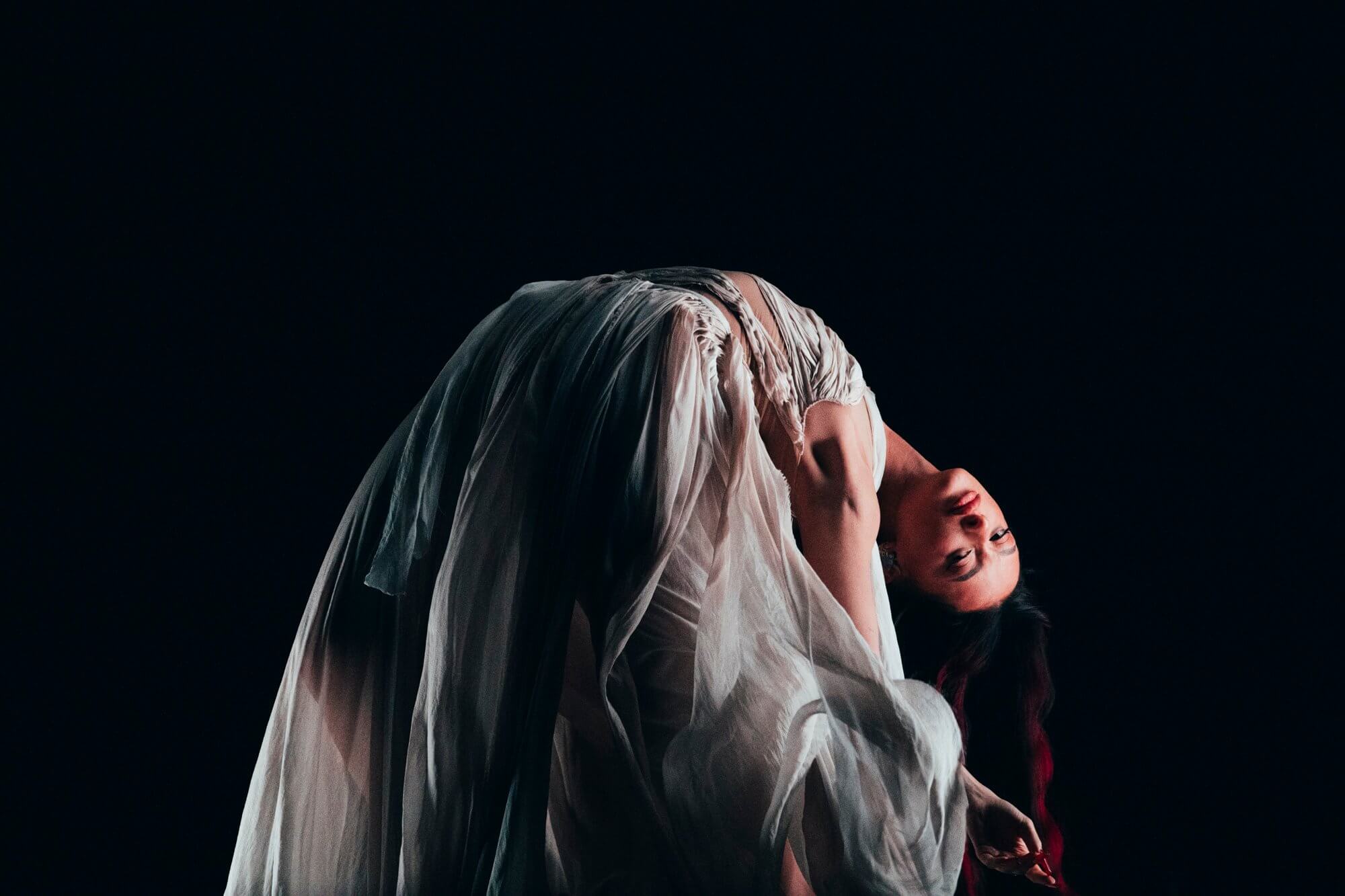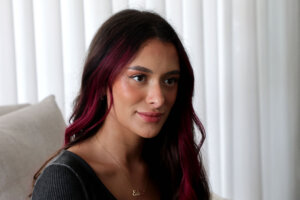Eden Golan’s impossible mission — conquer Eurovision and redefine Israel’s image
The 20-year-old Israeli singer is trying to make a statement, while saying as little as possible

Eden Golan, rehearsing “Hurricane” at the 2024 Eurovision Song Contest in Malmö, Sweden. Photo by Sarah Louise Bennett
MALMÖ, Sweden — On Instagram, Eden Golan is getting a facial before the biggest performance of her life, and posting about her eternal gratitude for her esthetician.
She is lighting yahrzeit candles for Yom HaShoah, Israel’s Holocaust Remembrance Day, her beautifully made-up smoky eyes cast down in a perfect countenance of grief.
She is doing an impeccable split across an airplane aisle, then looking hopefully out a window as that plane takes off, and hundreds of airport workers below turn on flashlights to spell out a message: “Good luck, Eden.”
That plane whisked Golan, Israel’s contestant in the 2024 Eurovision Song Contest, to Malmö, Sweden, where this week she will perform a song that underwent forced rewrites to tone down references to Oct. 7, but which is still quite clearly about Oct. 7. Here, she is pulling off a dual act: Onstage, performing her powerhouse song “Hurricane,” and offstage, pretending that she is just a remarkably talented young woman having the adventure of a lifetime — not, for one charged week, the face of a country whose participation in the song contest has sparked months of protests.
As Eurovision week began, Golan, who was born in Kfar Saba and now lives in Tel Aviv, appeared remarkably unruffled, especially for someone who, apart from rehearsals, is effectively confined to her hotel room under 24/7 armed protection. When I met her in a Malmö hotel on Monday — after passing through a lobby full of heavily armed police officers — she was relaxed and warm.
Golan, who is tasked, this week, with maintaining a fragile balance between pop star glamour and serious diplomatic mission, was dressed for the part in a sheer lace dress topped by a belted blazer, with a yellow ribbon pin symbolizing support for the hostages in Gaza on her lapel. (Support for the hostages has been a hallmark of Golan’s public profile; in the performance with which she won HaKokhav HaBa, the televised Israeli competition that determines the country’s Eurovision contestant, she wore the same pin.)
Golan is used to living in a kind of suspension. Her parents’ families both left Soviet countries for Israel — her mother is Ukrainian, her father Latvian. Her family moved to Moscow when she was 6; while living in Russia, she competed in a number of children’s singing competitions, including one in occupied Crimea, by law part of her mother’s native Ukraine. She has spoken openly about experiencing widespread antisemitism in Russia, including from classmates who refused to call her by her Hebrew name.
That experience of living between two realities may have helped prepare Golan for the unusual burdens that have accompanied her rise to stardom. In the last few months, she has become, to Israelis and their supporters, an emblem of defiant national pride amid escalating international recriminations over Israel’s war in Gaza; to global critics, she’s an avatar for Israel’s attempts to depict its military actions as reasonable and justified.
I asked how all this — the sudden ascent to the spotlight, and the particular harshness of its glare — has changed her.
“I’m the same person,” she said, “doing what I love most: connecting with people, sharing my love, sharing my music.”
Neon sets and quiet politics
There is something incongruous about Eurovision, which is renowned for its emphatic silliness, becoming a locus of political conflict. The same day I interviewed Golan, I watched a pantsless Finnish contestant with peroxide Weird Al Yankovic curls hatch from a gigantic neon-lit egg — an action viewers at home might find artistically objectionable, but probably not protest-worthy. (Personally, I kind of liked it.)
The show is, with a few exceptions, explicitly apolitical, hence its demand that Golan’s song, originally titled “October Rain,” be rewritten to remove lines like “They were all good kids, every one of them,” believed to refer to the victims of the Oct. 7 attack. An Israeli fan I met Sunday spoke emotionally about the value of the Eurovision “bubble,” a place in which the power of music makes real-world tensions disappear.
In practice, that bubble has been somewhat more permeable than Eurovision’s promoters might have the world believe.
There’s a long history of soft diplomacy around the event. When Spain hosted the competition in 1969, it used the occasion to make a case for its place in western Europe, despite its neighbors’ wariness of the far-right dictatorship of General Francisco Franco. Estonia took advantage of its 2001 win to argue for its post-Soviet place in Europe amid ongoing accession talks with the European Union.

And the competition has occasionally taken more explicit political stances. Russia was disallowed from competing in 2022 following its invasion of Ukraine, which won that year’s competition, with Eurovision’s executive supervisor calling the ban a stand for the “ultimate values of democracy.” This year, facing calls to impose similar restrictions on Israel in the wake of its war in Gaza, contest organizers have reframed the Russian ban as a punishment of Russian broadcasters for disregarding “membership obligations.”
Israel occupies a particularly tense space within Eurovision. It is eligible to compete because of its membership in the European Broadcasting Union, but protests have dogged its involvement since 1957, when Egypt and Syria quit the EBU upon Israel’s admission. (Israel did not first compete until 1973.) When Israel last hosted the contest, in 2019, it faced international boycott calls, with Irish and Icelandic fans in particular pressing their countries to withdraw from the competition, although neither did.
Israel’s response has remained consistent: “Promote the positive aspects” of its national story, as Israeli authorities put it in response to the 2019 protests. Then, the country reacted to protests by running Google ads that appeared to support the Boycott, Divest and Sanctions movement; users who clicked on them were redirected to a site proclaiming Israel to be “Beautiful Diverse Sensational.”
Golan’s appearance in Malmö is part of the 2024 version of that same response: She is here to rebrand Israel through song. She must play an apolitical part while serving a political mission, making a case for Israel on the world stage without addressing any of the issues that have made her country’s global standing feel so precarious. In her appearance in the competition’s second semifinal on Thursday — and, if the combination of jury-based and public voting that fuels Eurovision goes her way, Saturday night’s final — she will be seen as a mouthpiece for an entire country, without really being able to say anything.
Never an easy job, it’s a particularly daunting one this year, with Israel’s global reputation at its lowest point in decades. Yet Golan seems tailor-made to pull it off.
She has a name that appears handpicked for someone about to represent Israel on one of the world’s biggest stages: first, a synonym for an idyllic past, and last, the name of a still-disputed territory Israel seized in the 1967 War.
She is extraordinarily charming, bubbly and beautiful, polished without any sense of being guarded. She speaks often and passionately about the need to bring the hostages home, and how essential she felt it was for Israel to compete in Eurovision this year — to “show our voice,” she said — but she gracefully avoids mentioning the war. When I asked about the most difficult moment she’d experienced in her Eurovision journey, she was sunny: “I wouldn’t say there was something like, challenging,” she said, “I’ve been enjoying each and every step of this journey.”
She’s adept at affecting sincerity while making claims that seem, well, dubious. Facing a barrage of threats, she cannot go out to experience any of the standard Eurovision joys; she even skipped the Sunday opening ceremony, an occasion for competitors to interact with fans, attending a local observance of Yom HaShoah instead. But “to be honest, Malmö has been treating me really well,” she said. “They welcomed me with open hands.”
And she’s genuinely talented, with a vocal flexibility some Eurovision fans have compared to that of Ariana Grande; a fluid, natural sense of emotionality in her music; and a poised, vibrant stage presence. She has the kind of open glow that makes you want to root for her, no matter what she represents.
Representative of a nation
In that final HaKokhav HaBa performance, Golan delivered a crystalline rendition of Aerosmith’s “I Don’t Want to Miss a Thing” surrounded by empty chairs. The message was clear: The hostages should be here, filling those seats. Without them, something is missing from all of us. (The chairs were neon; the bright, brash Eurovision aesthetic keeps calm and carries on.)
“I am a very overall happy person,” she said, “even though we’re going through very, very difficult times as a country, and we have hostages that we need to bring home.”
Golan said she had never experienced a rocket siren until Oct. 7, when one woke her at 6:30 in the morning. But even in her narration of that day, she redirects quickly to the positive. Watching the news from her family’s apartment, she said, she saw “terrible stories” but also “the beauty — how the very first second, everyone united, everyone started helping.”
Golan habitually returns to the themes of finding healing, beauty and strength, especially in collective experiences. She “can’t wait for the crowd to fill up the entire arena, the energy,” she said; “I want to help people with my music.” She cannot perform without feeling an emotional connection to her music — “to truly feel it and portray it to the listeners” — and, when the song required rewrites to meet political neutrality rules, she wanted it to focus on “finding the light” in difficult times “and the way out.”
The result is a song that’s both positive and tormented: “Hours and hours, empowers / Life is no game, but it’s ours / While the time goes wild,” she sings.
Golan proudly sees herself as an ambassador for Israel: “It’s an absolute honor to be representing Israel at such times,” she said. Yet the imagery of those empty chairs, amassed around her during her final appearance on HaKokhav HaBa, perhaps anticipated the challenges that would face Golan once she won the competition.
Her message to her fellow Israelis is simple and direct: It’s a call of national pride, something that needs no explaining. But when it comes to the more subtle work in which she is engaged simply by being here — of making a case for a country on the world stage, as Spain did in the ’60s, and Ukraine in 2022 — it’s not clear exactly what Golan is an ambassador for. She wants to “show that we’re here,” she said: “I have the entire nation standing behind me.” But that’s where the message ends. From the outside, it’s an image that recalls Golan performing a yearning ballad alone onstage, backed by empty chairs, her pleas defined by an absence.
“At the end, we’re all going through something together, something horrible that no one should ever experience,” Golan said — the closest allusion to the war she made during our conversation. “And I can’t believe that it’s still going on.”
Violet Fearon, a Forward intern, contributed reporting.





















